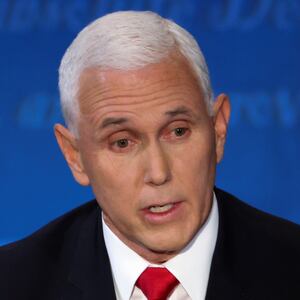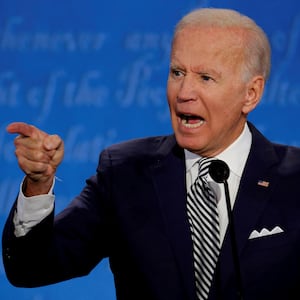When President Barack Obama bombed the first presidential debate of his 2012 re-election campaign, then-Vice President Joe Biden was tasked with triage: righting a campaign that appeared on the verge of sinking.
On Wednesday night, with President Donald Trump’s illness and hospitalization with COVID-19 cementing public skepticism of his administration’s handling of the pandemic, Vice President Mike Pence faced a similar, though even more daunting challenge. But while he successfully played the same role he has filled for the past four years—that of the Trump translator, sanitizing or spinning the more unseemly things espoused by his boss—there was one thing even the monomaniacally on-message VP couldn’t quite control: the narrative of the campaign has gotten out of Trump’s hands.
With silent audience members clad in masks and twin plexiglass barriers separating Pence and Senator Kamala Harris (D-CA)—installed over Pence’s objections—in order to prevent further transmission of the coronavirus by those in the president’s orbit, the vice president’s mission of wresting the nation’s attention away from the pandemic was always going to be a challenge. But even though only 10 minutes were dedicated to discussing the pandemic, the continued threat of the coronavirus loomed over the entire evening. And with Pence at the head of the White House’s coronavirus task force, that was suboptimal at best.
ADVERTISEMENT
“The American people have witnessed what is the greatest failure of any presidential administration in the history of our country,” Harris said at the debate’s outset. “They knew and they covered it up. The president said it was a hoax. They minimized the seriousness of it… and in spite of all of that today, they still don’t have a plan.”
Pence, seated in front of an audience holding tickets that included a warning that they could not hold the Commission on Presidential Debates or the University of Utah liable if they contracted COVID-19, appeared pained to explain away straightforward statistics and undeniable realities, like why the death rate in America was higher than other wealthy nations and how the administration could tell U.S. citizens to follow basic safety standards when the president and his team wouldn’t.
“The reality is, the work of the President of the United States goes on,” Pence said. “President Trump and I trust the American people to make choices in the best interest of their health,” Pence said.
He was saved, perhaps, by Harris’ decision not to pound away on the White House becoming the nation’s brightest-burning coronavirus hot spot since a Rose Garden pox party sickened an unknown number of staffers and supporters with the deadly virus.
The topics of the conversation, however, didn’t get much better for Team Trump from there. The White House’s preferred debate grist—foreign policy, trade and the looming Supreme Court nomination battle—were all relegated to later in the night, where Pence scored some points. But the specter of a deadly pandemic getting worse, an infected president hopped up on steroids, and even the revelations of that president’s small tax bill, simply overshadowed the discussions on safer turf for the president’s running mate.
Vice presidential debates can often be the political equivalent of following the Hippocratic oath. The priority: Do the ticket no harm. To that end, both Pence and—to a lesser, though still prominent extent—Harris were evasive with their answers or eager to stick to talking points.
Though the evening’s agenda was a grab bag of political topics—chosen by moderator Susan Page, whose follow-up questions were largely limited to metronomically saying “Mister Vice President” and “Thank you” half a dozen times when Pence went over time—Harris returned again and again to the Trump administration’s mishandling of the coronavirus pandemic. Asked about the vacancy on the Supreme Court, the senator brought the topic to COVID-19 survivors who may lose their health care; in a discussion about the economy, she told voters that with respect to Obamacare, “they’re coming for you.”
Pence’s debate performance featured only a small portion of the Trumpist theatrics from the first presidential debate last week, when the president interrupted and spoke over Biden so frequently that he was berated by moderator Chris Wallace. Though, like Trump, he notably declined to commit to a peaceful transition of power (albeit with more rhetorical guile).
Accordingly, various aides and officials on the Trump reelection effort were just happy that Pence… wasn’t Trump.
“He did not shout and interrupt through the entirety of this debate, and he didn’t say anything about the Proud Boys, so it’s definitely an improvement over the last [debate],” said a senior administration official.
Others were happy to try to make the evening, and much of the election homestretch, about the supposed left-wing threat of a Harris administration, not a Biden one.
“Our firm published a poll last week where 67 percent of the voters think if Biden were elected, within the four-year term, it’s likely Harris will be President,” John McLaughlin, a top Trump pollster, told The Daily Beast as he watched the VP debate live. “She’s not ready to [be] President, nor do I think most Americans share her liberal values and would want her to be President.”
On Harris’ side, there was no slam-dunk “that little girl was me” moment, although the senator’s skeptical facial expressions as Pence consistently ran over his speaking time became fodder on social media. But in several exchanges—including a surprisingly detailed “little history lesson” in which the former prosecutor cited Abraham Lincoln’s refusal to nominate a Supreme Court justice with less than a month before a presidential election—Harris’ reputation as a quick and nimble interlocutor was on full display.
In a representative exchange over foreign policy, Harris grilled Pence over Trump’s comments about service members being “losers” and “suckers” by bringing up another long-since-forgotten Trump scandal.
“When you want to talk about who is the current commander-in-chief, and what they care about and what they don’t care about, public reporting that Russia had bounties on the heads of American soldiers,” Harris said. “You know what a bounty is? It’s, somebody puts a price on your head and they will pay it if you are killed. Donald Trump had talked at least six times to Vladimir Putin and never brought up the subject. Joe Biden would never do that.”
Early in the debate, Harris did take a step back from hammering the Trump administration’s record to note her own biography: the daughter of two immigrant parents, one from Jamaica and another from India, making her the first Black and South Asian candidate on a major party presidential ticket. But beyond introducing herself to voters who might just be tuning in to the presidential campaign, Harris also implicitly noted her status as a woman of color—and a former prosecutor—in a discussion about race relations.
“I’ve talked with Breonna’s mother, Tamika Palmer, and her family, and her family deserves justice,” Harris said, in reference to the death of Breonna Taylor at the hands of police, saying that in her opinion, Taylor’s family has not gotten justice.
Pence handled the exchange over racism in policing—just as he did a section on climate change and on Trump’s self-avowed refusal to commit to a peaceful transfer of power should he lose—by making a glancing reference of the issue, then moving on to friendlier territory.
“There’s no excuse for what happened to George Floyd. Justice will be served,” Pence said. “But there is no excuse for the rioting and looting.”








